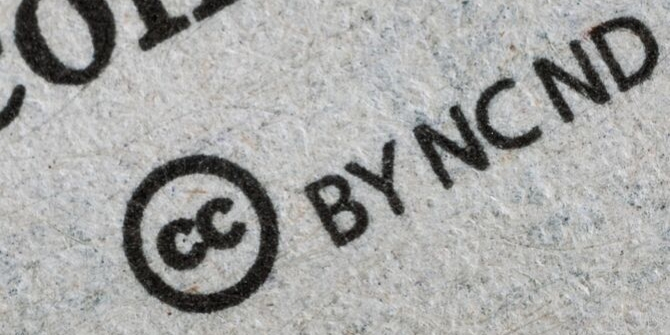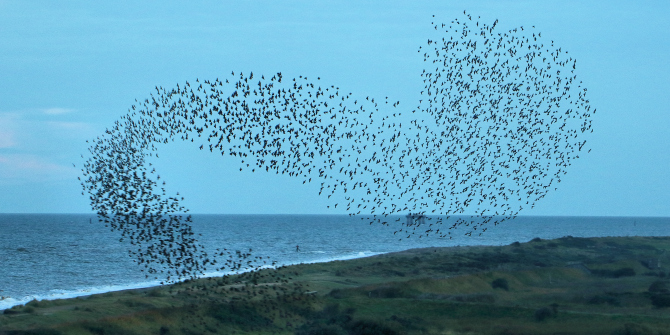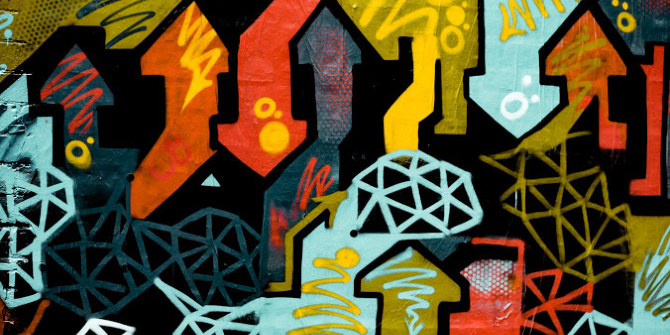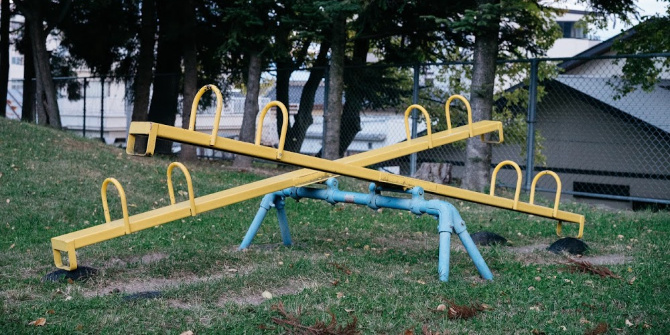The Moral Value of Open Access Should Not Be Negated By Geo-Political Borders
University researchers outside the EU who may not otherwise have access to research articles should not be excluded based on the actions of their government.

Send us a link
University researchers outside the EU who may not otherwise have access to research articles should not be excluded based on the actions of their government.

In practice the way in which research impacts and influences policy and society is often thought to be a rational, ordered and linear process. Whilst this might represent a ‘common sense’ understanding of research impact, this post reflects on how upending the primacy of data and embracing complexity can lead to a more nuanced and effective understanding of research impact.

One of the foundational aims of the open access movement, set out in the Budapest Open Access Initiative, was to provide access to research not only to scholars, but to “teachers, students and other curious minds” and in so doing “enrich education”. However almost two decades on from the declaration access to the research literature for educational purposes remains limited.

Mark Israel explores the ethics of self-plagiarism and asks, when is it right to reproduce social research?

This article outlines the four principles that give shape to a new, less standardised approach to research assessment called "evaluative inquiry": employing versatile methods; shifting the contextual focus away from the individual; knowledge diplomacy; and favouring ongoing engagement ahead of open-and-shut reporting.

When reading a research paper, can you be certain that the institution the author claims to be affiliated with is actually the institution that was responsible for supporting the research?

The extent to which researchers can assess the impact of their public engagement is often under-analysed and limited to success stories. Drawing on the example of development aid, it is argued that we need to widen the parameters for assessing public engagement.

This blog post highlights the historical precedent of Mary Quayle Innis and the unrecognised impact she had on her husband Harold Adams Innis’ career and suggests that the social sciences and humanities would benefit from a wider interpretation of scholarly attribution than is currently practiced.

Open access is often discussed as a process of flipping the existing closed subscription based model of scholarly communication to an open one. However, in Latin America an open access ecosystem for scholarly publishing has been in place for over a decade.

As flaws in the peer review process are highlighted and calls for reform become more frequent, it may be tempting for some to denigrate and dismiss the contributions of the reviewers themselves.

The future of the academic monograph has been questioned for over two decades. At the heart of this 'monograph crisis' has been a publishing industry centred on the print publication of monographs.

Plan S will also influence how learned societies, the organisations tasked with representing academics in particular disciplines, operate, as many currently depend on revenues from journal subscriptions to cross-subsidise their activities.

Academic flying is often justified on the basis that international conferences and travel are important to the production of new knowledge. However, there is no clear relationship between the amount of travel undertaken by academics and the quality of their research.

The purpose of peer review is often portrayed as being a simple ‘objective’ test of the soundness or quality of a research paper. However, it also performs other functions primarily through linking and developing relationships between networks of researchers.

Whilst a shift to gold (pay to publish) open access would deliver wider access to research, the lack of price sensitivity amongst academics presents a risk that they will be locked into a new escalating pay to publish system.

Science historian Aileen Fyfe explores how copyright has become intertwined with scholarly publishing.
Resolving the question of how to provide an infrastructure for open access books and monographs has remained a persistent problem for researchers, librarians and funders. The Open Research Library aims at bringing together all available open book content onto one platform, but has been met with mixed responses.

This article presents a new initiative from the Centre for Science and Technology Studies at Leiden (CWTS), to assess gender inequality in research publication across different institutions internationally and drive further change in the sector.

The progress of Open Access (OA) is often measured by the proportion of journals that have transitioned to OA publication models. However, a number of journals have made the opposite choice and moved from open to closed access.

The development of preprint servers as self-organising peer review platforms could be the future of scholarly publication.

When social scientists think about big data, they often think in terms of quantitative number crunching. However, the growing availability of ‘big’ qualitative datasets presents new opportunities for qualitative research.

Hayley Teasdale argues that PhD studies are an ideal time for developing your research communication and impact skills and growing your entrepreneurial and organizational capabilities.

Financial and social burdens of academic travel add an additional barrier to participation in research. If academia wants to address issues of diversity and equity in research, it must first acknowledge the effects of academic travel culture.

There is a wealth of advice and 'how to' guides available to academics on the subject of how research can have an impact on policy and practice. In this post Kathryn Oliver and Paul Cairney assess the value of this literature, arguing that unless researchers seek to situate research impact within processes of policymaking and academic knowledge production, this advice can ultimately reinforce current inequalities in research impact.

Gender bias in peer review has been much discussed in the wider research community. However, there have been few attempts to analyse the issue within the social sciences. This post highlights research undertaken by the Regional Studies Association to investigate the effect of gender on peer review outcomes.

The UK has benefitted from funder incentives that make Open Access appealing for authors, while US funders have taken a less interventionist approach to Open Access. This in turn has led to increased international collaboration for UK researchers.

Plan S raises challenging questions for the Global South. Even if Plan S fails to achieve its objectives the growing determination in Europe to trigger a “global flip” to open access suggests developing countries will have to develop an alternative strategy.

Reflections on the recent consultation period for Plan S, a funder led proposal for achieving universal open access to research papers.

Academic hiring and promotion committees and funding bodies often use publication lists as a shortcut to assessing the quality of applications. In order to avoid bias towards prestigious titles, plain language statements should become a standard feature of academic assessment.

How do early career researchers use Sci-Hub and why? In this post David Nicholas assesses early career researcher attitudes towards the journal pirating site.
